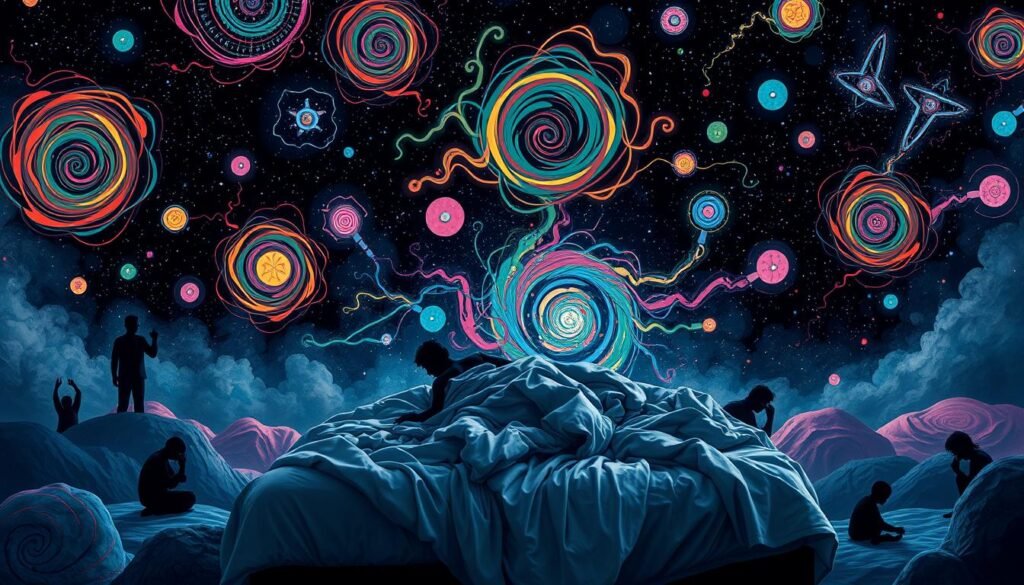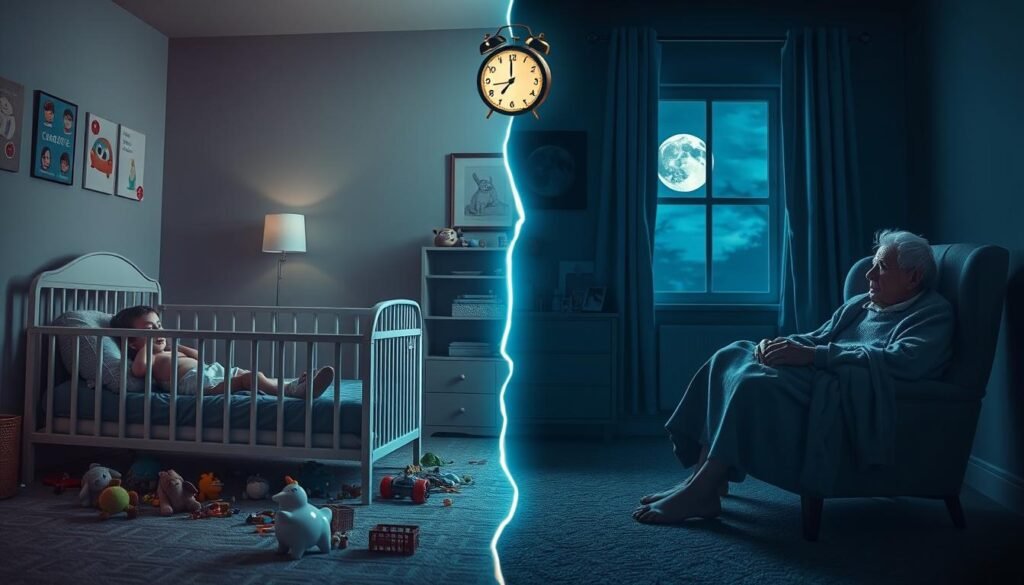Did you know about one third of people in the UK struggle with insomnia? This condition is more common in older adults. It can harm both mental and physical health. Understanding insomnia is key. Insomnia makes it tough to fall asleep, stay asleep, or causes early waking. Adults need 7 to 9 hours of sleep to be their best.
While some may face insomnia briefly, others endure it for months or years. This can ruin one’s life quality.
We will look into why insomnia happens and its impact. Issues like stress, anxiety, and life habits can cause it. These factors can hurt one’s well-being. To learn more, don’t forget to visit insomnia causes and effects. Insomnia can make you irritable and less productive at work.
Key Takeaways
- Insomnia affects about 1 in 3 people, mainly older adults.
- Stress, anxiety, and habits are usual causes of insomnia.
- Chronic insomnia can cause a lot of daytime tiredness and irritability.
- Better sleep habits can help manage insomnia.
- Cognitive Behavioral Therapy for Insomnia (CBT-I) is an effective treatment.
- Sleep experts can find the root problems in chronic cases.
Understanding Insomnia as a Sleep Disorder
Insomnia is a common sleep disorder affecting many people. Up to two-thirds deal with its symptoms at times in their life. It comes in two main types: acute and chronic. Acute insomnia can come from stress at work or home issues, lasting days to weeks. Chronic insomnia happens at least three nights a week for three months or more.
Many factors contribute to chronic insomnia. These include medical conditions like diabetes and chronic pain, and other sleep issues like restless legs syndrome and sleep apnea. Certain people are more at risk: women, older adults, and those with less income. Young and middle-aged African Americans also have a higher chance of getting insomnia.
Chronic insomnia can mess with your daily life a lot. It’s linked to serious health issues like high blood pressure and obesity. It can also lead to depression and a higher chance of substance abuse. People often feel sleepy, tired, and find it hard to think clearly during the day. This makes everyday tasks difficult and lowers life quality.
To fight insomnia, improving sleep habits is key. Creating a sleep-friendly space is a good start. Also, sticking to regular sleep times, exercising, and skipping naps help build better sleep routines. Keeping track of sleep in a diary can also spot problems.
Cognitive Behavioral Therapy for Insomnia (CBT-I) is a top way to treat chronic insomnia. It teaches relaxation and healthy sleep habits. While short-term insomnia might get better on its own, chronic cases usually need a professional’s help for improvement.
Common Insomnia Symptoms
Insomnia affects many people’s everyday lives and mental health. About one-third of adults will face insomnia at some point. This is especially true for older people.
Here are some signs:
- Difficulty falling asleep
- Frequent awakenings during the night
- Waking up too early in the morning
- Daytime fatigue and sleepiness
- Irritability and anxiety
- Difficulties in concentration and memory
Insomnia can make it hard to perform well at work and interact with others. Women and people who work changing shifts are more likely to have insomnia. If you can’t sleep well for over three months and it happens at least three times a week, it’s called chronic insomnia.
Knowing about insomnia symptoms is the first step to getting help. It can impact your physical and mental health a lot. Serious health problems can arise if insomnia isn’t treated.
| Insomnia Symptoms | Days Affected | Potential Insomnia Effects |
|---|---|---|
| Difficulty falling asleep | 3+ | Increased risk of depression |
| Frequent awakenings | 3+ | Impaired alertness |
| Early morning waking | 3+ | Higher chance of chronic health issues |
| Daytime fatigue | Daily | Reduced productivity |
| Irritability | Daily | Relationship problems |
What Are the Causes and Effects of Insomnia
Insomnia is a common sleep problem for many adults. Knowing what causes it can help us treat it better. Stress and big life changes often disrupt our sleep. Bad sleep habits make these problems worse.
Stress and Life Events
Stress is a big reason people can’t sleep. Things like work pressure, health worries, or losing someone important make it hard to sleep. Studies tell us stress affects our minds and bodies. It can make chronic insomnia more likely. Having depression or a lot of emotional stress makes sleep problems more likely too.
Poor Sleep Habits
Not sleeping at the same time every night harms our sleep. So does too much screen time before bed. Using our bedrooms for things other than sleep is another bad habit. These habits mess up our natural sleep cycles. But, creating good sleep routines can help fix sleep issues. This leads to better sleep over time.
The Role of Mental Health in Insomnia
Mental health is key in developing and continuing insomnia. Anxiety and depression play big roles in insomnia’s complexity. People with anxiety might get stuck in a loop of worry. This stops them from sleeping well. Insomnia and mental health issues need to be treated together.
Anxiety Disorders
Anxiety can cause long-term insomnia. Those facing anxiety might feel on edge and can’t calm down at night. This makes it hard to sleep and increases stress hormones. Many people with anxiety struggle to get good sleep. This affects their health.
Depression and Insomnia
Depression and insomnia are closely linked. People with depression often wake up too early. This makes them feel tired all day. Insomnia can make depression worse. This creates a harmful cycle. Many with depression also have insomnia. Treating both is vital for improving life quality.

| Mental Health Issues | Insomnia Presentation | Potential Impact |
|---|---|---|
| Anxiety Disorders | Difficulty falling asleep, frequent night awakenings | Increased fatigue, impaired concentration |
| Depression | Early morning awakenings, fragmented sleep | Worsened depressive symptoms, emotional instability |
| Post-Traumatic Stress Disorder | Nightmares, hyper-arousal at night | Chronic vigilance, fear of sleep |
Understanding how mental health and insomnia are linked can help find better treatments. Treating anxiety and depression along with insomnia may improve sleep. This could also make mental health better.
Impact of Medical Conditions on Sleep
Many medical conditions like chronic pain impact sleep. This can lead to insomnia, worsening health problems. Addressing these conditions improves sleep and health. Understanding the effect of medical conditions on sleep is key.
Chronic Pain and Insomnia
Conditions such as arthritis make sleep hard. They cause discomfort, making it tough to find a good sleeping position. This leads to poor sleep. Chronic pain also increases insomnia risks, creating a bad cycle. Insomnia then makes you feel more pain.
Sleep-Related Disorders
Sleep disorders like apnea make this worse. They stop you from getting deep sleep. Surprisingly, most adults with sleep problems don’t know they have them. This means they don’t get the right treatment, keeping the cycle of bad sleep going.
| Medical Condition | Effects on Sleep | Potential Solutions |
|---|---|---|
| Chronic Pain (e.g., Arthritis) | Difficulty finding a comfortable position; disrupted sleep patterns | Pain management therapies; sleep aids |
| Sleep Apnea | Frequent awakenings; decreased sleep quality | CPAP machines; lifestyle changes |
| Restless Legs Syndrome | Urgent need to move legs; insomnia | Medication; lifestyle modifications |
The Effects of Lifestyle Choices on Sleep Quality
Lifestyle choices can greatly affect how well we sleep. This is especially true for substances like caffeine, nicotine, and alcohol. They can mess up our sleep cycles. This leads to more trouble sleeping and can cause insomnia. To get better sleep, it’s important to be aware of our habits.
Caffeine, Nicotine, and Alcohol
Caffeine is in coffee, tea, and energy drinks. It can make it hard to fall asleep and shorten the time we sleep. Nicotine from smoking or vaping also harms our sleep. Alcohol might seem to help, but it actually makes our sleep worse. It causes broken sleep that isn’t refreshing. Staying away from these substances before bed can help improve our sleep and battle insomnia.
Importance of Sleep Hygiene
Good sleep hygiene can make a big difference in sleep quality. It’s about keeping a regular sleep schedule and having a bedtime routine that calms us down. Doing things like reducing screen time before bed, making sure our bedroom is cozy, and dealing with stress helps. These steps can help solve insomnia problems. They counteract the negative effects of some lifestyle choices on our sleep.

Insomnia Treatments: Finding Relief
Looking for effective ways to tackle insomnia is key for those having trouble sleeping. There are many methods to ease insomnia, and cognitive behavioral therapy (CBT) is a top choice. It helps by changing the thoughts and actions that mess with sleep.
Cognitive Behavioral Therapy for Insomnia
Cognitive behavioral therapy for insomnia, or CBT-I, is seen as the best method for sleep problems. Research shows it works as well as, or better than, sleep meds. It deals with the mental issues causing insomnia, teaching good sleep habits and creating a better sleep space. Those trying CBT-I see big improvements in sleep and overall happiness.
Medications for Insomnia
CBT is great, but sometimes meds are needed too. There are different sleeping pills for when you can’t fall or stay asleep. Eszopiclone (Lunesta), Ramelteon (Rozerem), and Zolpidem tartrate (Ambien) are some options. But, it’s good to use these pills short-term and at low doses to avoid dependence.
Besides prescriptions, you can find melatonin over the counter. And some try natural fixes or acupuncture, though results vary. Making life changes like setting a sleep routine and limiting caffeine and alcohol also help a lot. Pairing CBT, the right meds, and lifestyle changes is the best plan for beating insomnia.
Insomnia Across Different Age Groups
People of all ages can experience insomnia, each age with distinct challenges. Understanding these challenges is key to creating custom support. For adults, stress, health changes, and bad habits can cause insomnia. Young people might struggle with inconsistent sleep patterns and not wanting to follow bedtime schedules.
Insomnia in Adults
For adults, sleeping 7 to 9 hours a night is essential. Adult insomnia can be short-lived due to stress or last months. Many older adults face sleep pattern changes and health issues, leading to more insomnia cases. About half of those aged 65 and up experience insomnia symptoms. Knowing the risks, like age and health, helps identify those at greater risk. Untreated insomnia can harm job performance, driving safety, and life quality.
Child and Teen Insomnia Issues
Children and teenagers often face insomnia because of their internal clocks and resisting bedtime. Studies show 11% to 20% of teens have insomnia. It’s crucial to teach good sleep habits, like a steady schedule and a calming bedtime setting. Helping kids with insomnia means guiding both them and their parents towards better sleep habits.

Learning about insomnia in different age groups helps us support everyone struggling with it. As we become more aware, the need for effective solutions grows for everyone dealing with insomnia.
| Age Group | Prevalence of Insomnia | Main Causes | Treatment Options |
|---|---|---|---|
| Adults | Approx. 30% of adults experience symptoms | Stress, poor sleep habits, health conditions | Cognitive Behavioral Therapy, medications |
| Older Adults | About 50% aged 65 and older | Health issues, medication use, lifestyle changes | Therapy, medication, sleep hygiene practices |
| Children | 10-30% experience sleep issues | Delayed sleep phase, resistance to bedtime | Behavioral interventions, parental guidance |
| Teenagers | Approx. 11-20% | Irregular schedules, academic stress | Therapeutic approaches, sleep hygiene education |
For more information on the topic of insomnia across age groups, visit this resource.
Complications Associated with Chronic Insomnia
Chronic insomnia is common, affecting 10% to 15% of people. It’s more than just being tired. It affects daily life and health in big ways. For example, it can mess with how well you think, making it hard to remember things. This might lead to more mistakes at work or even accidents, especially when you need to be focused, like while driving.
It doesn’t just stop at thinking problems. People with insomnia often feel more anxious or depressed. These feelings can make insomnia worse, creating a tough cycle to break. The impact on your mood is significant, leading to irritability and stress.
Sleep deprivation can also harm your physical health. Studies link chronic insomnia to heart disease, high blood pressure, obesity, and diabetes. It shows why it’s crucial to fix sleep issues, not just for now, but for your future health.
In 2010, about 5.5 million doctor visits in the U.S. were for sleep problems. Many find that bad bedtime routines worsen their insomnia. Knowing how to manage insomnia, like with cognitive-behavioral therapy, is key to overcoming these challenges.
| Complications | Description |
|---|---|
| Cognitive Impairment | Decreased concentration and memory retention. |
| Mood Disorders | Increased risk of anxiety and depression. |
| Accidents | Higher likelihood of accidents due to reduced alertness. |
| Cardiovascular Issues | Link to conditions like hypertension and heart disease. |
| Metabolic Disorders | Increased risk of diabetes and obesity. |
Tackling sleep deprivation from chronic insomnia is crucial for a better life. Consulting healthcare experts for advice is a good step. Trying specific treatments and improving sleep habits can help a lot. This promotes health and well-being.
For more details on sleep deprivation effects and how to handle them, visit Sleep Disorders and Understanding Sleep Deprivation.
Conclusion
Insomnia is a challenging disorder that affects both mind and body deeply. Various things like genetics and certain medical conditions can make someone more likely to have sleep problems. Heart disease, diabetes, and chronic pain are examples of these conditions.
Choices in lifestyle, surroundings, and mental health issues can also change how well we sleep. Understanding these factors is key to finding the right treatments for insomnia.
To help those who struggle with sleeplessness, it’s important to tackle the root problems. This might include dealing with stress or improving sleep routines. Looking at the issue from all angles can help improve life quality since good sleep is essential for health and everyday function.
Insomnia also places a heavy load on society and the economy. It doesn’t just affect the person who can’t sleep. It can lead to worse performance in school and at work. Raising awareness and taking action against the causes of insomnia can help manage it better. This leads to a healthier community overall.